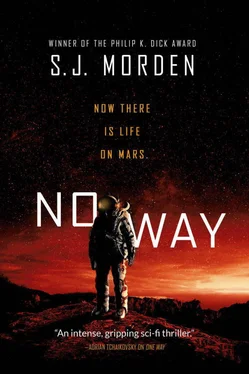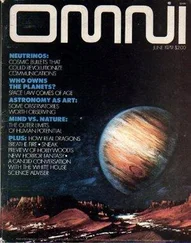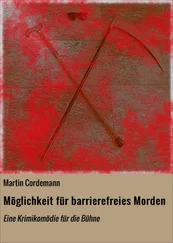Eventually, he worked his way out onto the summit plain, and there, despite his expectations, was the outpost, apparently intact and unharmed. Though he knew with his head that the wind couldn’t really exert any pressure, his experience of the storm had been overwhelming. If all he’d encountered was a few shreds of plastic clinging to twisted metal, he wouldn’t have been surprised—but a quick tour of the outside told him that it was still bolted down, still under pressure, still functioning. The air was clear—not rain-washed, but scoured—and the cold probably helped to settle what was left of the dust that might have otherwise been blowing around. He checked the temperature, and it had dropped over a hundred degrees from yesterday.
The leeward side of the hab was higher than the windward. Dust and sand had dropped there, and now had frozen into place. The other side was blasted clean down to the bedrock. All traces of tracks and footprints had been erased, wherever they’d lain.
The aluminum supports and rings were almost mirror-like where they were exposed to the wind, enough that he could catch his own reflection. Suit lights and blank face. Unrecognizable as himself.
He picked off one of the life supports from the buggy and carried it into the airlock. The surface of the door was smoother than it had been. Some of the detailing had flattened. The look of the door seal had changed too, from plump and effective to worn and thin. They had some spares. He needed to swap that out before it failed.
But the pressure held as he pumped the airlock up, and because he was alone, he had to climb out of his suit in order to exchange life supports. His old one still had a good six hours in it. He’d probably swap it out again when he passed this way on the return leg; he just wanted the buffer that a fresh one would give him.
Goddammit, it was cold. Cold enough that the sweat on his feet threatened to stick to the floor panels. He should have thought of that. Everything he touched was at below minus one hundred. He was going to get burns. The main base never got that cold. Even when they hadn’t had heating. Stupid to get frostbite or hypothermia. Careless. Dangerous.
Quickly, then. Get one of the jackets the crew used and stand on that while pulling the pack from its clips, and plugging the new one in, then scrambling into the insulated spacesuit as fast as he dared. He thumbed the “close” tab on his control panel, and waited for the heated air to start circulating again while he ran on the spot and clapped his hands together, trying to get his circulation going again.
When he and Zeus had hauled an airlock out with them onto the eastern plain beyond Rahe, in order to collect the last of their wayward supplies, it had been difficult to change life supports in such a cramped space, and cold for sure. On the way back now, it would be day, and the outside temperature would have gone up as far as freezing, and that would be OK. Certainly not as bad as he’d just experienced: he’d done himself some damage this time, because he hadn’t thought it through.
He curled his toes, clenched his fingers. He could still feel everything, which was good, but he’d scorched his fingertips and the soles of his feet. Yes, he’d learned, and he’d lived. He was damn certain he wouldn’t be doing that again without taking extra measures.
Outside, it was only getting colder. And maybe it was the fact that he was higher than Everest that should have given him the clue as to just how cold it was going to get. Cold things were brittle. He’d have to be extra careful, because breaking plates, or worse, bearings, was going to leave him stranded and in trouble. There’d been no real choice in his route, though: going around the base of the mountain would have been a round trip of over two hundred miles, and completely out of range.
Frank climbed up and restarted the buggy, and headed initially towards the caldera, in order to get past the next river valley. He’d then turn south, around the CT-B crater, and follow the direction of the lava flows down to the plain again. There was a good stretch of flat ground before the trench, before more hilly terrain, caused by a huge impact crater off to the south-west.
He rumbled on, feeling the vibration in his hands and his spine, as the frozen ground hammered under the tires. He kept the suspension loose, reasoning that he needed all the grip he could get. After what seemed an interminable stretch across the broad summit, he started feeling the bite of the straps against his chest, holding him in his seat. Downhill.
He’d gone further than he ever had done before, well beyond the area they’d searched during the dust-storm. No tracks, and neither was there an astronaut’s body, encircled with blown sand. His lights deepened the shadows and made them solid, but he could pick out the few craters that he needed to avoid and steer around them.
The headlights, and staring at the patch of illuminated ground ahead of him, ruined his night vision, but even so he could see one of the moons of Mars dash overhead in the dark sky, and the first lightening of the sky over to the east—just a hint, a pinking of the black. He could see faint features out on the plain that stretched from the foot of the volcano, as far as the horizon.
The fuel cell was… OK. The drive up was always draining, and even though he could ease off now, he faced the same climb on the way back. Better keep an eye on that. His suit was good, though, and the temperature, now that he was off the very top of the mountain, was no longer quite as low, while still being triple-figures negative. 0500. Dawn in an hour or so.
He drove on, and on. Features in the distance didn’t seem to come any closer, even though the ground was speeding past underneath him. But it did grow gradually lighter, and eventually he killed the buggy lights completely. He was so far from home, in a landscape that was completely unfamiliar to him, even by Mars’s standards.
Then he was at the bottom. One last bump of the tires as they dropped off the lava shelf and into the sand sea, and he was within twenty miles of his target. An hour there, an hour back to this point. 0540. He’d made good time.
From now on, he’d be making a dust plume behind him, but it was still very early, and it wasn’t likely that anyone would be ranging out beyond the immediate vicinity of M2. He checked his air, and his fuel cell levels again. His suit was still fine. His fuel cell? He made some quick calculations. If he could get back to the top, then there’d be no problem. He could coast down to the Heights, even if he had to walk from there. He wasn’t in that zone yet, but he’d have to watch it all the same.
The sun broke into the sky. Shadows, which had grown diffuse and gray, sharpened, and the land turned rose-red for a moment. Then the frost started to boil away, and fog blanketed the ground, so thickly that Frank stopped for the time it took for it to mostly disperse again.
When it had, he could see clearly the hilly country around the big impact crater miles off to the south-west. He wasn’t going to miss the trench, which was closer and more or less due south. Everything was going well enough.
There was no evidence he’d been seen, yet.
The quality of the vibrations in his hands changed as he left the plain and drove up onto the more chaotic debris. A surface layer of dust hid blocks of rock thrown hard and fast along with the pulverized and melted debris. It was like driving over broken concrete in places, so seeking out the deep tracts of sand was worthwhile.
Then there it was. The ground in front of him seemed to stop. A few yards more, and he could see across to the other side, the steep cliff edges with their bands of exposed rock, black blocky lava and lighter material sandwiched between. He coasted to a halt, and slowly, stiffly, dismounted from the buggy.
Читать дальше












